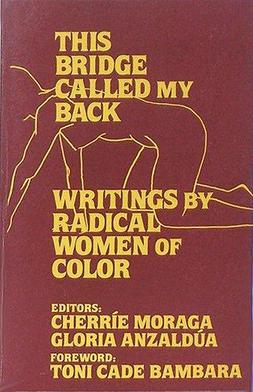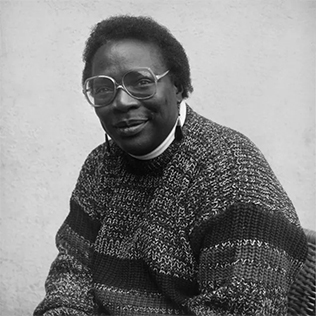Related Research Articles

Lesbian feminism is a cultural movement and critical perspective that encourages women to focus their efforts, attentions, relationships, and activities towards their fellow women rather than men, and often advocates lesbianism as the logical result of feminism. Lesbian feminism was most influential in the 1970s and early 1980s, primarily in North America and Western Europe, but began in the late 1960s and arose out of dissatisfaction with the New Left, the Campaign for Homosexual Equality, sexism within the gay liberation movement, and homophobia within popular women's movements at the time. Many of the supporters of Lesbianism were actually women involved in gay liberation who were tired of the sexism and centering of gay men within the community and lesbian women in the mainstream women's movement who were tired of the homophobia involved in it.
Cherríe Moraga is a Chicana feminist, writer, activist, poet, essayist, and playwright. She is part of the faculty at the University of California, Santa Barbara in the Department of English. Moraga is also a founding member of the social justice activist group La Red Chicana Indígena, which is an organization of Chicanas fighting for education, culture rights, and Indigenous Rights.
Cultural feminism is a term used to describe a variety of radical feminism that attempts to revalue and redefine attributes culturally ascribed to femaleness. It is also used to describe theories that commend innate differences between women and men.
Black feminism, also known as Afro-feminism chiefly outside the United States, is a branch of feminism that focuses on the African-American woman's experiences and recognizes the intersectionality of racism and sexism. Black feminism also acknowledges the additional marginalization faced by black women due to their social identity.

Barbara Smith is an American lesbian feminist and socialist who has played a significant role in Black feminism in the United States. Since the early 1970s, she has been active as a scholar, activist, critic, lecturer, author, and publisher of Black feminist thought. She has also taught at numerous colleges and universities for 25 years. Smith's essays, reviews, articles, short stories and literary criticism have appeared in a range of publications, including The New York Times Book Review, The Black Scholar, Ms., Gay Community News, The Guardian, The Village Voice, Conditions and The Nation. She has a twin sister, Beverly Smith, who is also a lesbian feminist activist and writer.

Chicana feminism is a sociopolitical movement, theory, and praxis that scrutinizes the historical, cultural, spiritual, educational, and economic intersections impacting Chicanas and the Chicana/o community in the United States. Chicana feminism empowers women to challenge institutionalized social norms and regards anyone a feminist who fights for the end of women's oppression in the community.
The feminist sex wars, also known as the lesbian sex wars, sex wars or porn wars, are terms used to refer to collective debates amongst feminists regarding a number of issues broadly relating to sexuality and sexual activity. Differences of opinion on matters of sexuality deeply polarized the feminist movement, particularly leading feminist thinkers, in the late 1970s and early 1980s and continue to influence debate amongst feminists to this day.
Kitchen Table: Women of Color Press was an activist feminist press that was closely related to the National Black Feminist Organization (NBFO) which was started in 1980 following a phone conversation between Barbara Smith and at the suggestion of her friend, poet Audre Lorde. Beverly and Barbara Smith and their associate Demita Frazier together cofounded the Combahee River Collective (CRC). The Kitchen Table: Women of Color Press was most active beginning in 1981, but the Press became inactive soon after Audre Lorde's death in 1992. Smith explains how the motivation for starting a press run by and for women of color was that "as feminist and lesbian of color writers, we knew that we had no options for getting published, except at the mercy or whim of others, whether in the context of alternative or commercial publishing, since both are white-dominated."
Founded in Upstate New York in 1978 by Maureen Brady and Judith McDaniel, Spinsters Ink is one of the oldest lesbian feminist publishers in the world. It is currently owned by publisher Linda Hill, who purchased the Spinsters Ink in 2005. Hill also owns Bella Books and Beanpole Books.

Conditions was a lesbian feminist literary magazine that came out biannually from 1976 to 1980 and annually from 1980 until 1990, and included poetry, prose, essays, book reviews, and interviews. It was founded in Brooklyn, New York, by Elly Bulkin, Jan Clausen, Irena Klepfisz and Rima Shore.
Beverly Smith in Cleveland, Ohio, is a Black feminist health advocate, writer, academic, theorist and activist who is also the twin sister of writer, publisher, activist and academic Barbara Smith. Beverly Smith is an instructor of Women's Health at the University of Massachusetts Boston.

This Bridge Called My Back: Writings by Radical Women of Color is a feminist anthology edited by Cherríe Moraga and Gloria E. Anzaldúa, first published in 1981 by Persephone Press. The second edition was published in 1983 by Kitchen Table: Women of Color Press. The book's third edition was published by Third Woman Press until 2008, when it went out of print. In 2015, the fourth edition was published by State University of New York Press, Albany.

Pat Parker was an American poet and activist. Both her poetry and her activism drew from her experiences as an African-American lesbian feminist. Her poetry spoke about her tough childhood growing up in poverty, dealing with sexual assault, and the murder of a sister. At eighteen, Parker was in an abusive relationship and had a miscarriage after being pushed down a flight of stairs. After two divorces she came out as lesbian "embracing her sexuality" and said she was liberated and "knew no limits when it came to expressing the innermost parts of herself".
Feminist views on BDSM vary widely from acceptance to rejection. BDSM refers to bondage and discipline, dominance and submission, and Sado-Masochism. In order to evaluate its perception, two polarizing frameworks are compared. Some feminists, such as Gayle Rubin and Patrick Califia, perceive BDSM as a valid form of expression of female sexuality, while other feminists, such as Andrea Dworkin and Susan Griffin, have stated that they regard BDSM as a form of woman-hating violence. Some lesbian feminists practice BDSM and regard it as part of their sexual identity.

Against Sadomasochism: A Radical Feminist Analysis is a 1982 radical feminist anthology edited by Robin Ruth Linden, Darlene R. Pagano, Diana E. H. Russell, and Susan Leigh Star. The authors critique sadomasochism and BDSM, with most identifying sadomasochism as rooted in "patriarchal sexual ideology".
Third Woman Press (TWP) is a Queer and Feminist of Color publisher forum committed to feminist and queer of color decolonial politics and projects. It was founded in 1979 by Norma Alarcón in Bloomington, Indiana. She aimed to create a new political class surrounding sexuality, race, and gender. Alarcón wrote that "Third Woman is one forum, for the self-definition and the self-invention which is more than reformism, more than revolt. The title Third Woman refers to that pre-ordained reality that we have been born to and continues to live and experience and be a witness to, despite efforts toward change ..."
Queer of color critique is an intersectional framework, grounded in Black feminism, that challenges the single-issue approach to queer theory by analyzing how power dynamics associated race, class, gender expression, sexuality, ability, culture and nationality influence the lived experiences of individuals and groups that hold one or more of these identities. Incorporating the scholarship and writings of Audre Lorde, Gloria Anzaldúa, Kimberlé Crenshaw, Barbara Smith, Cathy Cohen, Brittney Cooper and Charlene A. Carruthers, the queer of color critique asks: what is queer about queer theory if we are analyzing sexuality as if it is removed from other identities? The queer of color critique expands queer politics and challenges queer activists to move out of a "single oppression framework" and incorporate the work and perspectives of differently marginalized identities into their politics, practices and organizations. The Combahee River Collective Statement clearly articulates the intersecting forces of power: "The most general statement of our politics at the present time would be that we are actively committed to struggling against racial, sexual, heterosexual, and class oppression, and see as our particular task the development of integrated analysis and practice based upon the fact that major systems of oppression are interlocking. The synthesis of these oppressions creates the conditions of our lives." Queer of color critique demands that an intersectional lens be applied queer politics and illustrates the limitations and contradictions of queer theory without it. Exercised by activists, organizers, intellectuals, care workers and community members alike, the queer of color critique imagines and builds a world in which all people can thrive as their most authentic selves- without sacrificing any part of their identity.

All the Women Are White, All the Blacks Are Men, But Some of Us Are Brave (1982) is a landmark feminist anthology in Black Women's Studies printed in numerous editions, co-edited by Akasha Gloria Hull, Patricia Bell-Scott, and Barbara Smith.
Persephone Press was a publishing company and communications network run by a lesbian-feminist collective in Watertown, Massachusetts. The company published fourteen books between 1976 and 1983, when the organization was sold to Beacon Press.
A Woman's Place was a feminist bookstore in Oakland, California. Opened in 1970, it was one of the first two feminist bookstores in the United States.
References
- ↑ Sims, Karen; Mason, Rose; Pagano, Darlene (1982). "Racism and Sadomasochism: A Conversation with Two Black Lesbians". In Linden, Robin Ruth; Pagano, Darlene R.; Russell, Diana E. H.; et al. Against Sadomasochism: A Radical Feminist Analysis. San Francisco: Frog in the Well. pp. 99–105.
- ↑ "Business Feminism". Los Angeles Review of Books. Retrieved November 21, 2018.
- ↑ "Darlene Pagano papers". oac.cdlib.org. Retrieved November 21, 2018.
- ↑ Hogan, Kristen (2016). The Feminist Bookstore Movement: Lesbian Antiracism and Feminist Accountability. Duke University Press. doi:10.1215/9780822374336. ISBN 978-0-8223-7433-6.
- ↑ Rich, B. Ruby (1998). Chick flicks : theories and memories of the feminist film movement. Durham: Duke University Press. ISBN 978-0822321064. OCLC 38535937.
- ↑ Rich, B. Ruby (1986). Samois; Linden, Robin Ruth; Pagano, Darlene R.; Star, Susan Leigh; Russell, Diana E. H.; Snitow, Ann; Stansell, Christine; Thompson, Sharon; Vance, Carol (eds.). "Feminism and Sexuality in the 1980s". Feminist Studies. 12 (3): 525–561. doi:10.2307/3177911. JSTOR 3177911.
- ↑ Moraga, Cherríe; Anzaldúa, Gloria (2015). This bridge called my back : writings by radical women of color. Moraga, Cherríe,, Anzaldúa, Gloria (Fourth ed.). Albany, NY. ISBN 9781438454399. OCLC 894128432.
{{cite book}}: CS1 maint: location missing publisher (link) - ↑ Duggan, Lisa (1995). Sex wars : sexual dissent and political culture . Hunter, Nan D. New York: Routledge. ISBN 978-0415910361. OCLC 32199648.
- ↑ Gerhard, Jane F. (2001). Desiring revolution : second-wave feminism and the rewriting of American sexual thought, 1920 to 1982. New York: Columbia University Press. ISBN 978-0231504973. OCLC 51543202.
- ↑ Pleasure and danger : exploring female sexuality. Vance, Carole S. London: Pandora. 1989. ISBN 978-0044405931. OCLC 22425329.
{{cite book}}: CS1 maint: others (link) - ↑ "Darlene Pagano papers". Online Archive of California. Retrieved November 25, 2018.